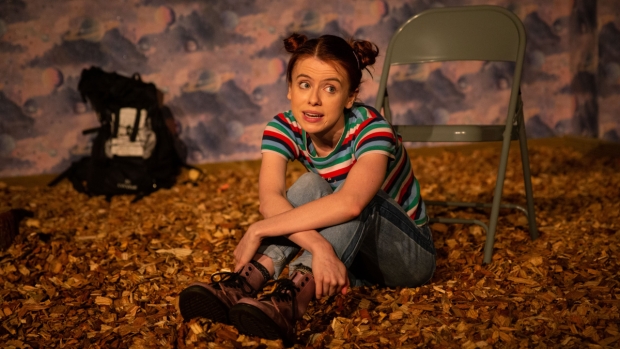Instructions for a Teenage Armageddon at Southwark Playhouse – review

© Mark Senior
I mean, seriously, who'd want to be a teenager again? The angst, the hormones, the uncertainty, the peer pressure, the awful skin… Even those rare people who harbour fond memories of their teen years and might be tempted to go back to a time when they had their whole lives ahead of them and more energy than they knew what to do with, are likely to be put right off by Rosie Day's grim and gritty tragicomic monologue.
The 16-year old at the centre of this particular Armageddon has more on her plate than most: her older sister has died from an eating disorder, her parents' marriage has fallen apart, and she struggles to relate to anybody at school. Day invests her with a sparky, nihilistic wit, and paints a vivid picture of the sheer bloody awfulness of day-to-day teen life. One moment she's sassy, confrontational, pretty obnoxious really… the next she looks like the wounded child she in fact is.
Day's ability to convey this duality is impressive and unsettling, although a slight slowing of pace in the delivery would be helpful, as the first portion of the play sounded garbled and was only intermittently comprehensible. The practise of mic-ing actors in straight plays has become more and more common of late, and it would certainly benefit this piece: at one point, from my seat in the penultimate row of four I could hear the interval crowd from Operation Mincemeat (playing in the larger house) better than Day on stage.
In an innovative move, director Georgie Staight has Day's character interact with video projections of actors such as Amanda Abbington and Philip Glenister (as her warring parents) and Isabella Pappas (as a super-cool sort-of friend). The effect is certainly funny and eye-catching, but doesn't really add anything significant, and technically it feels a little rough round the edges.
There aren't many pitfalls of being a teenager that don't get hurled at the theatrical wall here, and while the play doesn't necessarily tell us anything new, it is still an urgent piece of storytelling. The lead character is groomed from afar by a much older man, then, in a particularly harrowing section, loses her virginity to him, sustaining considerable internal injuries, which are duly discovered by a doctor. The play touches on the lack of outlets for young people to really talk about the issues troubling them, and the too-easy reliance on prescribing anti-depressants rather than aiming for true understanding and finding solutions.
Perhaps the most interesting strand of the story – the lead character's relationship with her late older sister – is woven in and out of the script with some dexterity, and ultimately packs a real emotional wallop. The final note is one of cautious optimism, and if it sounds a bit like a string of homilies or a self-help book ("be kind whenever you can, even if the world isn't being kind to you", "how much you achieve has nothing to do with what a valuable human you are"), it's the sort of upbeat sentimentality that provides genuine comfort to a bewildered soul trying to find their place in the world.










